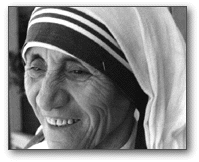 Mother Teresa was born in Skopje (today the capital of Macedonia) on August 27, 1910. Her original name was Agnes Gonxha Bojaxhiu. Her father, who was of Albanian descent, ran a small farm. At the age of twelve, while attending a Roman Catholic elementary school, she records that she knew she had a vocation to help the poor. She decided to train for missionary work, and a few years later made India her choice. At the age of eighteen she left the parental home in Skopje and joined the Sisters of Loreto, an Irish community of nuns with a mission in Calcutta. After a few months' training in Dublin she was sent to India, where in 1928 she took her initial vows as a nun.
Mother Teresa was born in Skopje (today the capital of Macedonia) on August 27, 1910. Her original name was Agnes Gonxha Bojaxhiu. Her father, who was of Albanian descent, ran a small farm. At the age of twelve, while attending a Roman Catholic elementary school, she records that she knew she had a vocation to help the poor. She decided to train for missionary work, and a few years later made India her choice. At the age of eighteen she left the parental home in Skopje and joined the Sisters of Loreto, an Irish community of nuns with a mission in Calcutta. After a few months' training in Dublin she was sent to India, where in 1928 she took her initial vows as a nun.From 1929 to 1948 Mother Teresa taught at St. Mary's High School in Calcutta, but the suffering and poverty she glimpsed outside the convent walls made such a deep impression on her that in 1946 she received permission from her superiors to leave the convent school and devote herself to working among the poor in the slums of Calcutta. Although she had no funds, she started an open-air school for homeless children. Soon she was joined by voluntary helpers, and financial support was also forthcoming from various church organisations, as well as from the municipal authorities. This made it possible for her to extend the scope of her work, and on October 7, 1950, she received permission to start her own order "The Missionaries of Charity", whose primary task was to love and care for those persons nobody was prepared to look after. Today the order comprises some one thousand sisters and brothers in India, of whom a small number are non-Indian. Many have been trained as doctors, nurses and social workers, and are in a position to provide effective help for the slum population as well as undertaking relief work in connection with such natural catastrophes as floods, epidemics, famine and swarms of refugees. Mother Teresa has fifty relief projects operating in India: these comprise work among slum-dwellers, children's homes, homes for the dying, clinics and a leper colony. The order has also spread to other countries, and undertakes relief work for the poorest of the poor in a number of countries in Africa, Asia and Latin America. The order has also established itself in Italy, Great Britain, Ireland and the United States. Mother Teresa's work has aroused considerable attention throughout the world, and she has received a number of awards and distinctions: in 1971 she received the Pope John XXIII Peace Prize, in 1972 the Nehru Prize for her promotion of international peace and understanding, and in 1979 the Balzan Prize for promoting peace and brotherhood among the nations.
|
|
BOES.ORG International Campaign to Ban Landmines (ICBL) ICBL NGO-links www.nobel.no Related BBC-links To be opened in new window Celebrations in Calcutta 19 October, 2003, 11:33 GMT In pictures: Mother Teresa beatified 19 October, 2003, 11:02 GMT Pope beatifies Mother Teresa 19 October, 2003, 09:55 GMT Pilgrims' joy at Teresa ceremony 19 October, 2003, 09:03 GMT |
Laureates 2003: Shirin Ebadi, Iran, 1947-. Lawyer and human rights activist, for her efforts for democracy and human rights. She has focused especially on the struggle for the rights of women and children. 2002: Jimmy Carter, USA, 1924-. For his decades of untiring effort to find peaceful solutions to international conflicts. 2001: The prize was divided equally between: The United Nations ( U.N.) and its Secretary-General, Kofi Annan, Ghana, 1938- For their work for a better organized and more peaceful world. 2000: Kim Dae Jung, Republic of Korea, 1925-. For his work for democracy and human rights in South Korea and in East Asia in general, and for peace and reconciliation with North Korea in particular. 1999: Doctors Without Borders (Médecins Sans Frontières) In recognition of the organisation's pioneering humanitarian work on several continents. 1998: The prize was divided equally between: John Hume, Northern Ireland, 1937-; and David Trimble, Northern Ireland, 1944-. For their efforts to find a peaceful solution to the conflict in Northern Ireland. 1997: The prize was divided equally between: International Campaign to Ban Landmines (ICBL) and Jody Williams, USA, 1950-. 1979: Mother Teresa, India, 1914-1997. Leader of the Order of the Missionaries of Charity. |
|
|